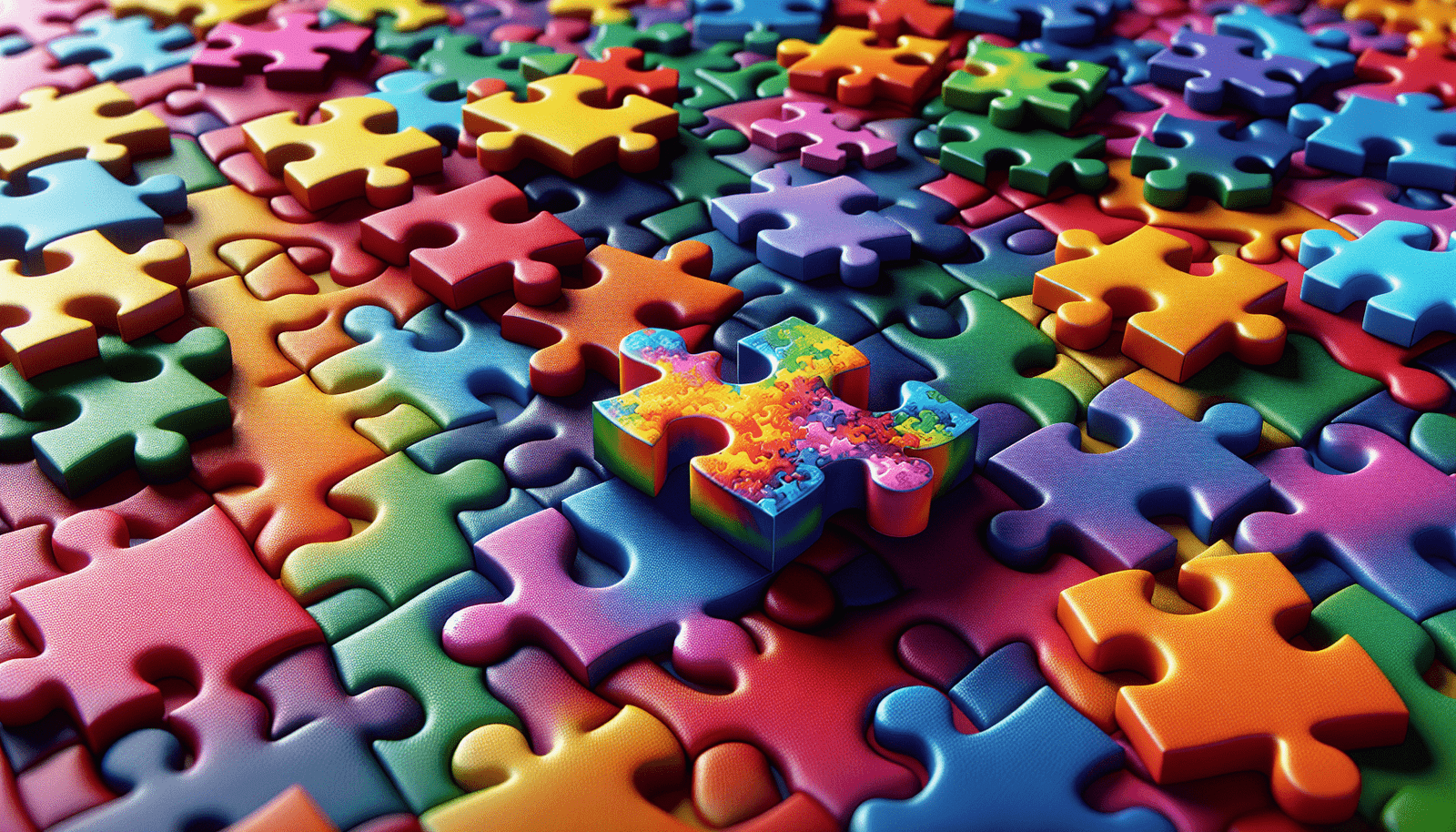Are you looking for engaging activities that can help your child develop their problem-solving skills? Look no further! In this article, we will explore a range of creative problem-solving games that are specially designed for kids. These games not only provide entertainment but also help children enhance their critical thinking abilities, creativity, and ability to think outside the box. Whether your child prefers solving puzzles, engaging in hands-on activities, or playing interactive games, we have got you covered. Get ready to embark on a fun-filled journey of problem-solving adventures with your little one!
The Importance of Creative Problem Solving
Creative problem solving is a vital skill that children should cultivate from a young age. It not only helps them to think outside the box, but also nurtures their cognitive development, enhances their creativity and innovative thinking, boosts their confidence, promotes teamwork and cooperation skills, and encourages critical thinking.
Improve cognitive development
Engaging in creative problem solving games can have a positive impact on a child’s cognitive development. These games challenge children to think critically, analyze situations, and come up with unique solutions. By exercising their brain in this way, children can enhance their problem-solving skills, improve their logical reasoning, and develop a deeper understanding of cause and effect relationships.
Enhance creativity and innovative thinking
Creative problem solving games provide children with opportunities to think creatively and outside the box. These games often require kids to come up with innovative solutions to solve puzzles or overcome obstacles. By encouraging imaginative thinking, children can expand their creativity and develop their ability to think creatively even in real-life scenarios.
Boost their confidence
Successfully solving problems in creative ways can greatly boost a child’s confidence. When children find solutions to challenging puzzles or come up with new ideas, they gain a sense of accomplishment and self-assurance. This newfound confidence can then translate into other aspects of their lives, giving them the courage to tackle challenges and try new things.
Promote teamwork and cooperation skills
Many creative problem solving games involve teamwork and cooperation. By engaging in these games, children learn to work together, share ideas, respect other opinions, and collaborate effectively towards a common goal. These skills are not only essential for success in school but also in future professional and personal endeavors where working in teams is often required.
Encourages critical thinking
Creative problem solving games encourage children to think critically. These games challenge kids to analyze information, evaluate options, and make informed decisions. They also teach children to think strategically, consider different perspectives, and understand the consequences of their actions. By engaging in these activities, children develop their critical thinking skills, which they can apply in various areas of their lives.
Interested in seeing the products we recommend?
Check out our carefully crafted list of items
Types of Creative Problem Solving Games
There are various types of creative problem solving games that children can engage in. Each game type offers unique benefits and helps children develop different skills. Here are some popular types of creative problem solving games:
Brain teasers
Brain teasers are puzzles or riddles that challenge the mind and stimulate critical thinking. They often require thinking outside the box and coming up with innovative solutions. Brain teasers can range from simple to complex and come in various forms, such as word problems, visual puzzles, or mathematical challenges.
Puzzles
Puzzles are a classic form of creative problem solving games. They come in various forms, including jigsaw puzzles, crossword puzzles, logical puzzles, and Tangram puzzles. Puzzles require children to think critically, analyze patterns, and develop strategies to solve them. They also help improve fine motor skills and hand-eye coordination.
Imagination ignition activities
Imagination ignition activities are designed to spark creativity and imaginative thinking. These activities can include story completion, where children are encouraged to finish a story with their own creative ideas, or doodle art, where children create artwork using their imagination. Imagination ignition activities provide a platform for children to explore their creativity, express themselves, and think outside the box.
Scavenger hunts
Scavenger hunts are exciting and interactive games that involve searching for specific items or completing tasks based on provided clues. They promote problem-solving skills, teamwork, and cooperation. Scavenger hunts can be conducted both indoors and outdoors, and they can be themed based on different subjects or interests.
Role-play games
Role-play games involve children taking on different roles and acting out scenarios. These games encourage creativity, social interaction, and problem-solving skills. Role-play games can involve scenarios like acting as a merchant and consumer, reenacting historical events, or playing superheroes. By participating in role-play games, children learn to think creatively, adapt to different situations, and collaborate with others.
Brain Teasers for Kids
Brain teasers are a great way to challenge and entertain children while improving their problem-solving skills. Here are some brain teasers suitable for kids:
Sudoku for kids
Sudoku is a number puzzle game that requires logical thinking and problem-solving skills. It can help children develop their concentration, spatial reasoning, and critical thinking abilities. There are various levels of difficulty available, making it suitable for children of different ages and skill levels.
Riddles and answers
Riddles are an excellent way for children to exercise their critical thinking abilities while having fun. They often involve wordplay and require children to think creatively to find the answer. Riddles can be found in books, online, or even created by parents or teachers to challenge children’s minds.
Word searches
Word searches are puzzles that involve finding hidden words within a grid of letters. They help improve children’s vocabulary, concentration, and visual perception skills. Word searches can be themed based on different subjects, such as animals, fruits, or countries, making them both educational and entertaining for kids.
Mazes
Mazes are labyrinth-like puzzles that require children to find a path from the starting point to the end point. Solving mazes can enhance children’s problem-solving skills, spatial awareness, and hand-eye coordination. Mazes can be found in activity books or created by parents or teachers using various themes and levels of difficulty.
Magic Square
Magic Square is a mathematical puzzle that involves arranging numbers in a square grid so that the sum of the numbers in each row, column, and diagonal is the same. This puzzle stimulates logical thinking, number sense, and pattern recognition in children. Magic Square puzzles can be found in puzzle books or online platforms dedicated to mathematical challenges.
Puzzle Games
Puzzle games offer a fun and engaging way for children to develop their problem-solving skills. Here are some popular puzzle games:
Jigsaw puzzles
Jigsaw puzzles involve piecing together an image by assembling interlocking pieces. They help improve children’s visual perception, spatial reasoning, and fine motor skills. Jigsaw puzzles come in various difficulty levels, from simple puzzles with fewer pieces to complex ones with hundreds or even thousands of pieces.
Crosswords
Crossword puzzles are word games that involve filling in words based on given clues. They enhance children’s vocabulary, spelling, and critical thinking skills. Crosswords can be found in puzzle books, newspapers, or online platforms that provide interactive crossword puzzles suitable for kids.
Logical puzzles
Logical puzzles, also known as logic grid puzzles or logic problems, challenge children to use deductive reasoning to solve puzzles. These puzzles often involve organizing information and using clues to eliminate possibilities until the correct solution is found. Logical puzzles can vary in complexity and include puzzles like Sudoku, Einstein’s riddle, or grid-based logic puzzles.
Rubik’s cube
Rubik’s cube is a popular three-dimensional puzzle that challenges children’s spatial awareness, problem-solving, and pattern recognition skills. Solving a Rubik’s cube requires logical thinking and strategic moves to align the colors on each side of the cube. There are various tutorials and resources available to help children learn different solving techniques.
Tangram puzzles
Tangram puzzles are ancient Chinese puzzles that consist of seven geometric shapes that can be arranged to form various objects or shapes. They help children develop spatial awareness, creativity, and problem-solving skills. Tangram puzzles come with sets of cards or puzzle books that depict shapes to be created using the seven pieces.
Imagination Ignition Activities
Imagination ignition activities are designed to fuel children’s creativity and imaginative thinking. These activities enable children to think outside the box and come up with unique ideas. Here are some imagination ignition activities to try:
Story completion
Story completion activities involve starting a story and allowing children to use their imagination to create an ending. This activity helps children develop their storytelling skills, creativity, and critical thinking abilities. It can be done individually or as a group, where each person contributes to the story.
Exquisite corpse drawing
Exquisite corpse drawing is a collaborative art activity where each participant takes turns drawing a segment of a picture without seeing what the others have drawn. The final picture is revealed at the end, resulting in a unique and often whimsical creation. This activity encourages creativity, communication, and teamwork.
Doodle art
Doodle art is a free-form drawing activity that allows children to let their imagination run wild. Children can doodle and draw whatever comes to mind, letting their creativity flow without any constraints. Doodle art can be done using paper and pencils or digital drawing tools.
Build something from recycled materials
Building something from recycled materials is an environmentally-friendly activity that promotes creativity and problem-solving skills. Children are encouraged to repurpose household items or discarded materials to build something new and unique. This activity not only stimulates creative thinking but also teaches children the importance of recycling and sustainability.
Create your own puzzle or game
Encouraging children to create their own puzzles or games is a fantastic way to foster creativity and critical thinking. Children can invent their own puzzles, board games, card games, or even video games. This activity allows children to think analytically, consider rules and strategies, and exercise their imagination.
Scavenger Hunts
Scavenger hunts are thrilling and interactive games that keep children engaged while developing their problem-solving skills. Here are different types of scavenger hunts to try:
Treasure hunts
Treasure hunts involve searching for clues and following a series of instructions to find hidden treasure or objects. These hunts can be organized both indoors and outdoors, making them suitable for various occasions. Treasure hunts challenge children’s problem-solving skills, logical thinking, and attention to detail.
Nature hunts
Nature hunts encourage children to explore the outdoors and discover the wonders of nature. Participants are given a list of items, such as specific plants, insects, or natural objects, to find and collect. This type of scavenger hunt not only promotes problem-solving skills but also helps children develop an appreciation for the environment.
Photo hunts
Photo hunts require children to seek out specific objects or scenes and capture them through photographs. Participants can be given a list of specific requirements, such as finding something blue or something that starts with a specific letter. Photo hunts enhance children’s observation skills, creativity, and photography abilities.
Indoor hunts
Indoor hunts are a great option for rainy days or when outdoor space is limited. Children are given a list of items or clues to find within the confines of a house or a specific room. Indoor hunts encourage problem-solving skills, critical thinking, and exploration of one’s surroundings.
Educational hunts
Educational hunts are designed to combine learning with fun. These hunts focus on specific subjects, such as history, science, or math, and provide educational elements along with the challenge of finding items or solving clues. Educational hunts help children apply their knowledge in a practical and engaging way.
Role-play Games
Role-play games enable children to step into different roles and engage in pretend play scenarios. These games foster creativity, social skills, and problem-solving abilities. Here are some role-play game ideas:
Merchant and Consumer
In a merchant and consumer role-play game, children take on the roles of shopkeepers and customers. They learn to negotiate, make choices, and solve problems related to buying and selling items. This game helps develop communication skills, critical thinking, and an understanding of basic economics.
Classroom Role-play
Classroom role-play allows children to take turns being the teacher, students, or even different characters from history or literature. This game promotes creativity, cooperative learning, and problem-solving skills. It allows children to explore different perspectives, develop empathy, and enhance their knowledge in various subjects.
Superhero Adventure
Superhero adventure role-play games enable children to become the heroes of their own stories. They can create and act out scenarios where they solve problems, overcome challenges, and save the day. Superhero adventures encourage creativity, imaginative thinking, and collaboration among participants.
Historical Figures Role-play
Historical figures role-play games involve children researching and embodying different historical figures. They can recreate historical events, deliver speeches, or engage in discussions as these characters. Historical role-play games encourage critical thinking, research skills, and a deeper understanding of the past.
Environment-based Role-play
Environment-based role-play games allow children to explore real-world scenarios related to the environment and sustainability. They can take on roles like environmental activists, scientists, or wildlife conservationists, and work together to solve environmental problems. This game promotes critical thinking, problem-solving, and awareness of environmental issues.
Interested in seeing the products we recommend?
Check out our carefully crafted list of items
Using Technology in Creative Problem Solving
Technology can play a significant role in enhancing creative problem-solving skills. There are various technology-based resources and platforms that provide interactive and engaging experiences for children. Here are some ways technology can be incorporated:
Educational apps
Educational apps designed for tablets or smartphones offer a wide range of games and activities that promote creative problem-solving skills. These apps often combine learning with entertainment, allowing children to engage in problem-solving challenges while acquiring knowledge in various subjects.
Video games promoting problem-solving
Video games can be powerful tools for promoting problem-solving skills in children. Many video games require strategic thinking, analytical skills, and creative problem solving to progress through levels or complete objectives. From puzzle games to adventure games, a wide variety of video games are available that encourage critical thinking and problem-solving abilities.
Online puzzles and brainteasers
The internet provides a vast array of online puzzles and brainteasers that challenge children’s problem-solving skills. These puzzles can be found on websites dedicated to brain teasers or educational platforms. Online puzzles offer instant feedback and can be tailored to various difficulty levels, making them accessible and engaging for children of different ages and abilities.
Virtual reality games
Virtual reality (VR) games offer an immersive and interactive experience that can enhance problem-solving skills. Through VR, children can be exposed to realistic scenarios where they have to solve problems, make decisions, and think on their feet. VR games can be educational and provide a unique way for children to develop their creative problem-solving abilities.
Coding games
Coding games introduce children to the world of programming and computational thinking. These games empower children to create their own games or interactive stories, teaching them problem-solving skills, logical thinking, and creativity. Coding games often come with user-friendly interfaces and tutorials to help children get started with coding.
Incorporating Creative Problem Solving Games in Education
Creative problem solving games can be integrated into educational settings to enhance learning and development. Here are some ways to incorporate these games in education:
Incorporating games in lesson plans
Teachers can include creative problem solving games as part of their lesson plans. Games that align with the curriculum can be used to reinforce concepts, engage students, and promote critical thinking. This approach helps make learning more enjoyable and interactive, allowing students to apply their knowledge in a practical context.
Promoting group activities
Group activities that involve creative problem solving can be incorporated into classroom settings. These activities foster collaboration, teamwork, and communication among students. Working together to solve problems encourages peer learning, allows students to appreciate different perspectives, and promotes socialization and cooperation.
Using games for assessment
Creative problem solving games can also be used for assessment purposes. Teachers can design games that assess students’ understanding of specific concepts, their problem-solving abilities, or their critical thinking skills. Including games in assessments provides a more engaging and dynamic approach to evaluating student learning.
Play-based learning benefits
Play-based learning, which incorporates creative problem-solving games, has been shown to have numerous benefits for students. It helps foster a positive learning environment, improves motivation and engagement, enhances critical thinking and problem-solving skills, and develops social-emotional skills. Play-based learning encourages students to take an active role in their education and promotes a deeper understanding of concepts.
Promoting a growth mindset through games
Creative problem-solving games can help cultivate a growth mindset in students. By encouraging them to embrace challenges, persist in the face of setbacks, and view failures as opportunities for growth, games promote a belief in the ability to develop skills and improve. This mindset is crucial for lifelong learning and success in various areas of life.
Case Studies of Successful Implementation of Creative Problem Solving Games
Numerous case studies have highlighted the successful implementation of creative problem solving games in various educational settings. Here are a few examples:
Teacher-driven initiatives
Many teachers have implemented creative problem solving games in their classrooms and witnessed positive outcomes. Through games, they have noticed improvements in students’ problem-solving skills, critical thinking abilities, and engagement in learning. These initiatives have helped create a dynamic and interactive learning environment that promotes student growth and success.
Homeschooling successes
Parents who homeschool their children often incorporate creative problem solving games into their curriculum. They have seen the benefits of these games, such as increased creativity, improved problem-solving skills, and enhanced critical thinking abilities in their children. Homeschooling provides a flexible environment where games can be customized to suit the needs and interests of individual children.
After-school clubs and organizations
Many after-school clubs and organizations focus on utilizing creative problem solving games to enhance learning and development. These clubs provide platforms for students to engage in cooperative problem-solving activities, explore their interests, and develop their skills in a supportive and enjoyable environment. Students who participate in these clubs often experience personal and academic growth.
Success in special education
Creative problem solving games have shown tremendous success in special education settings. These games provide inclusive environments where students with diverse learning needs can engage at their own pace. Games can be customized to accommodate individual abilities, support skill development, and foster a sense of achievement and inclusion among students with special needs.
Inspiring stories from around the world
There are countless inspiring stories from around the world that highlight the transformative power of creative problem-solving games. These stories feature children who have overcome challenges, developed critical thinking skills, and achieved success through their engagement with these games. From inventing innovative solutions to real-life problems to pursuing academic and professional careers, these stories demonstrate the long-lasting impact of creative problem solving games.
In conclusion, creative problem solving games are more than just entertainment. They play a crucial role in nurturing cognitive development, enhancing creativity and innovative thinking, boosting confidence, promoting teamwork and cooperation skills, and encouraging critical thinking in children. With various types of games available, such as brain teasers, puzzles, imagination ignition activities, scavenger hunts, and role-play games, children have a wide range of options to choose from. By incorporating technology and integrating these games into education, we can tap into the potential of creative problem solving and empower children with the skills they need to succeed in the ever-changing world.
Interested in seeing the products we recommend?
Check out our carefully crafted list of items




